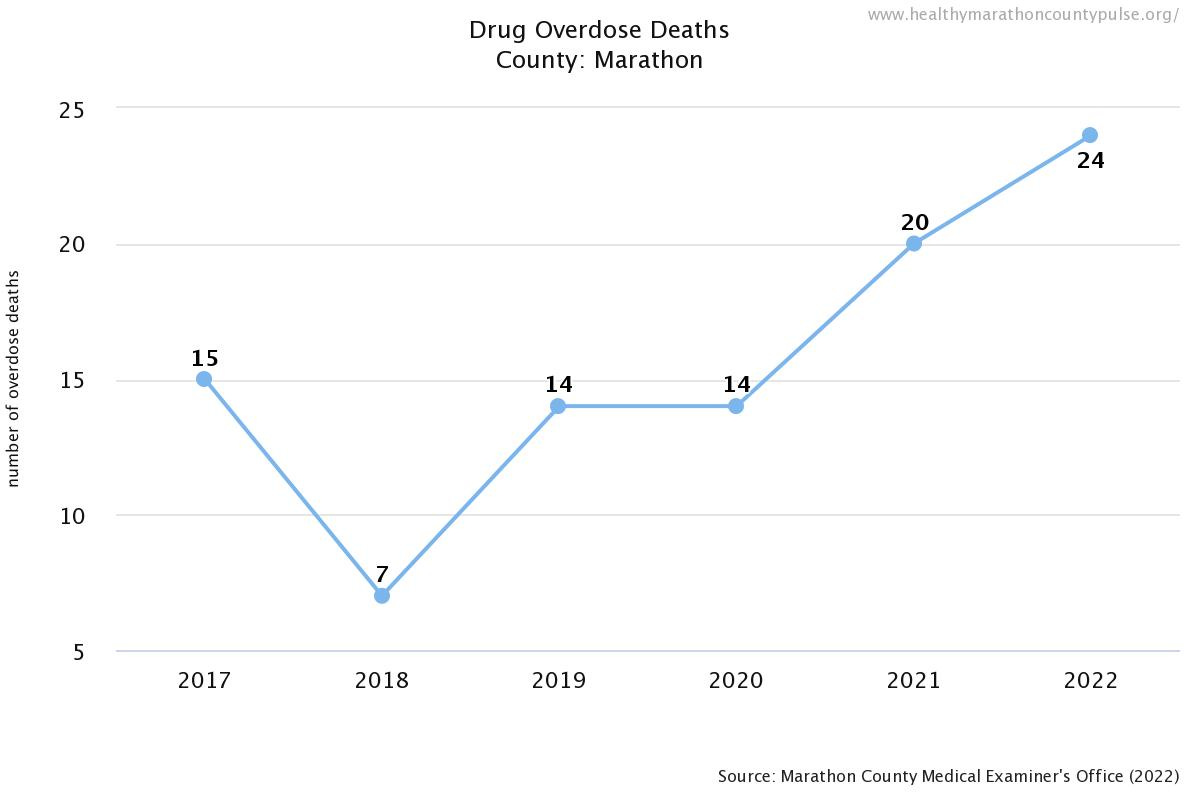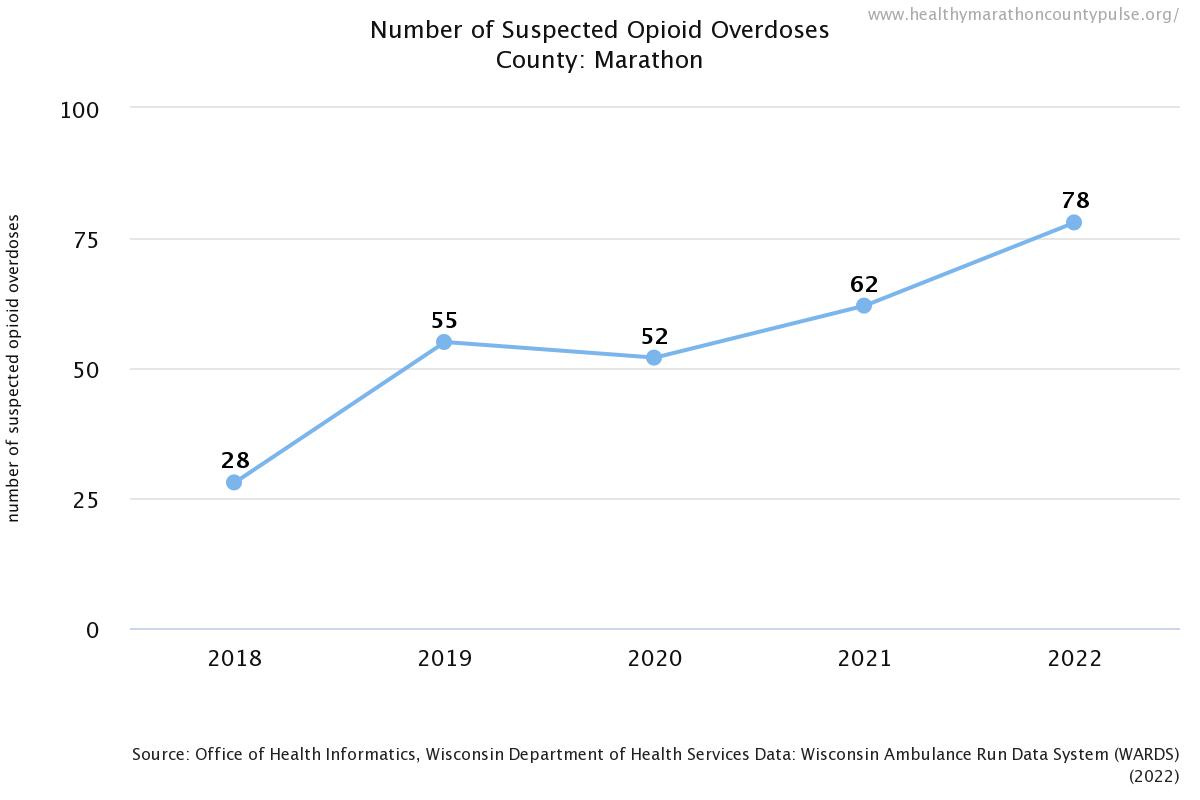Overdose deaths rising in Marathon County
The same can be said about suspected overdoses, as the county weighs what to do with settlement money from class action lawsuits against opioid manufacturers.
Last year 24 people died from overdosing on drugs in Marathon County - the most on record since the county started tracking that data.
And it’s been on a steady rise since 2018, according to data from the Marathon County Medical Examiner’s office.
And it’s not just deaths. Suspected overdoses — situations in which someone overdosed on some kind of drugs but survived, most likely because of emergency medical workers or intervention by hospital staff — are also increasing. The county saw 78 in 2022, again the most on record.
The rise in overdoses from medications coincides with two phenomena:
The opioid medication crisis, in which opioid pain medications were over-prescribed without taking into account the risk of addiction (because those risks were downplayed by companies such as Purdue Pharma, about to go bankrupt because of class action lawsuits).
The rise of fentanyl, a powerful narcotic that, when laced into other drugs such as heroin, create much more powerful doses while slashing per unit cost for dealers. The drug is so powerful that investigating officers have been known to overdose on the drug just from touching it. According to the CDC, 150 people in the U.S. per day die from synthetic opioids such as fentanyl.
All that comes on the backdrop of two situations: One is that the county is in the midst of receiving its portion of settlement money from class action lawsuits (71 of 72 counties and some municipalities participated in the state’s lawsuit, which was joined with other states — I wonder how that one county is feeling about their decision right now?).
And around something else: The county is hoping next year to start construction on a regional forensics science center — or in layman’s terms, a morgue. How’s that related? One of the main reasons for the county pursuing a morgue is that right now any death investigation that requires a forensic autopsy — including overdose deaths, as well as homicides, etc — need to be taken to Madison, Milwaukee or Fond du Lac because those are the only places that perform them.
And that costs time and money. A deputy must accompany the body to the autopsy and back, taking that deputy off the road. As well as the medical examiner herself, taking her away from an office that is already understaffed as death investigations continue to mount.
I first broke news that the county was considering building a morgue back in 2015. So it’s been a long process. And the cost has grown. It was estimated in 2017 to cost about $6-7 million. Now that price tag is more like $14 million. (With contingency.)
County leaders are hopeful a number of state and federal funding sources will help pay for the construction. And during their sales pitch to the county board, proponents of the project say it should be self-sustaining. Why? Because a number of northern Wisconsin counties and some Minnesota and Upper Michigan counties are in the same boat. A morgue in Marathon County would save them a ton of travel time. So, the county ought to be able to sell its services to those counties who have said they will use it, and that ought to fund operations.
But anyone would likely agree that it’s unfortunate that the county needs it in the first place. One overdose is too many; 24 is staggering.
Can the settlement money help? Marathon County so far has received $700,000 and is projected to receive another $2.1 million. County leaders are leaning toward hiring a consultant to conduct a gap analysis to show what services are most missing in the county to help fight addiction, and or what population needs the most help.
One major gap that is about to be filled is a good treatment program — Lakeside Recovery just reopened its services. I was one of the first to report on Lakeside’s medically-monitored treatment program, and spent some time observing their sessions. Lakeside closed during COVID and only recently reopened.
At this point in my career I’ve interviewed dozens of former addicts (as they’ll tell you, they always consider themselves addicts - it’s part of the mental reframing of their treatment). A common theme emerges for those who have been successful in their recovery: They usually hit some kind of rock bottom, something that help them reach a point where it hits them that they absolutely need to do something different. And then there needs to be some program in place to help them.
But even then, it’s an ongoing process; for many there will be relapses. But the Lakeside Recovery program did have a pretty good track record in graduating people from its programs and helping them re-enter into society.
Hopefully its reopening can have an impact on the current numbers of overdoses. Because something clearly needs to change.
Want to keep up with the story? Subscribe to The Wausonian to get all the updates on local news. And, consider a paid subscription to help support local journalism, keep local leaders honest and to see everything The Wausonian reports on.
Already a paid subscriber? Use this referral link and earn credit toward your subscription when people sign up through your unique link, using the button below.




Good reporting, Brian. There's definitely correlation, and possibly causation looking at the trend lines of deaths and overdoses since the closing of Lakeside Recovery. In our Wausau City Council discussions on homelessness in Wausau the lack of medically monitored addiction treatment always comes up as an obstacle to the effectiveness of our outreach officer and charity programs offering assistance on the streets and shelters. The reopening of Lakeside Recovery is a blessing.